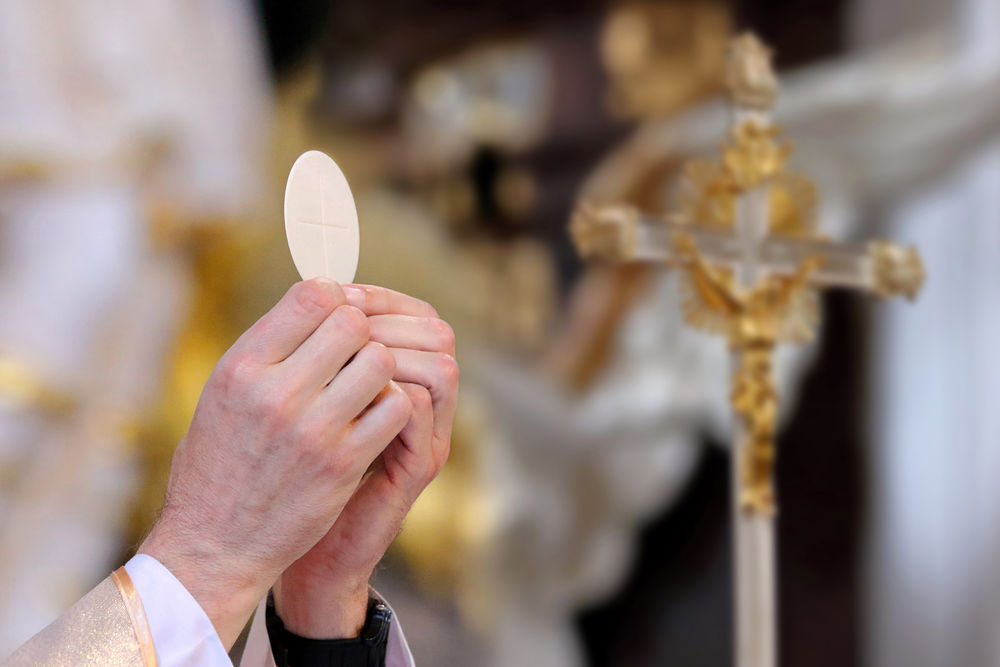Why can’t a Catholic take communion in a Protestant church? If I am at a wedding for example, it just seems like the neighborly thing to do.
Neighborliness is indeed a virtue, and it’s good to want to find common ground with our separated brethren. But some things cannot be compromised for society. This is one of them. Remember that communion was the first dividing controversy in Jesus’ ministry. The Eucharist, as Catholics believe it, has always been a source of division in the world—as is Jesus.
For the first 1,500 years of the Church there was one understanding of what the Eucharist is. Read the Church Fathers and you will see: though they did not have the term “transubstantiation,” early Christians believed that Christ is really and truly present in the Eucharist, and they took great pains to keep those who did not believe from receiving it.
50 years after the Reformation, a variety of views on the Eucharist emerged among non-Catholic Christians and that persists to this day. For Catholics, Communion is an expression of a Christian unity achieved, not a longing for one that does not yet exist. Canon law provides that Catholics may only receive the sacraments from Catholic ministers, though it also provides for exceptions for Catholics to receive outside the Catholic Church in cases of necessity, but only in those churches with a valid priesthood. Most non-Catholic churches do not have a valid priesthood. Hence, their communion is, for Catholics, invalid.
Accepting communion is saying I believe (that’s what the Amen! is, after all) to all that that particular community is teaching. A Catholic looks to the Catholic Church to teach him, form his conscience and guide his life, as well as for the sacraments that nourish the spiritual life. Non-Catholics view things very differently from Catholics and although their advice that all are welcome at their communion table may be well meaning, it is not the advice of the Church.
When Catholics receive communion in another ecclesial setting, it causes scandal. As much as we wish for Christian unity, we do not yet have it and making it appear that we do sends a signal that it doesn’t matter where one worships.
The Eucharist is the source, summit and focus of our life in Christ. It communicates Christ himself to us and is a real and powerful means of grace. It should not be confused with the communion services of other traditions. Given that God, in the person of Jesus, established communion in the Church and told us what it is (see John 6), it seems we owe it to God to participate in that sacrament as, and only as, he set it out. And he set that out through the Church to whom the sacrament was given.
Episcopal churches — there are now many schisms of that tradition — pose a particular problem because the liturgy looks so much like the Mass, and because some argue that they, too, believe in the Real Presence. In fact, some of the more orthodox Episcopal congregations are much more outwardly reverent towards their communion than many Catholics are towards the Eucharist.
Regardless of what Episcopalians might think, that those who broke away from the Catholic Church and formed the Anglican Communion did not intend their communion as a Real and Substantial Presence is reflected in the 39 Articles that established the Anglican faith. Further, the Church has ruled very clearly that holy orders in the Episcopal ecclesial bodies are not valid, meaning that from a Catholic perspective, their Eucharist is not valid and Catholics may not receive.
We are called as Catholics to witness to our faith. That means living visibly as Catholics, showing the world the incredible grace that flows through Christ’s Church. Among those graces is the incredible privilege of receiving Jesus Christ, body and blood, soul and divinity, at Mass. It is sometimes good, in the interests of friendship and ecumenism, to attend non-Catholic services with our loved ones. But what a witness it would be to refrain from communion and explain, gently and lovingly, why.
The answer isn’t just “because the Church tells me I can’t.” The Church, like a good mother, knows her children need guidance. Smart children accept that. And it is worth remembering that if we do as the Church teaches, she will never lead us away from God. We have the richness of the Catholic faith. We have Jesus truly and substantially present at every Mass, and we receive him into our very selves. There is incredible beauty in that.
The neighborly thing to do is to invite others to come and share the feast with us, isn’t it?
Barbara Golder had a 40-year career in medicine and law, including health care ethics. She is now the award-winning author of the ‘Lady Doc’ mystery series and serves as Director of Adult Faith Formation and Evangelization at the Basilica of Sts. Peter and Paul in Chattanooga, Tennessee. She blogs at ladydoclawyer.com.

